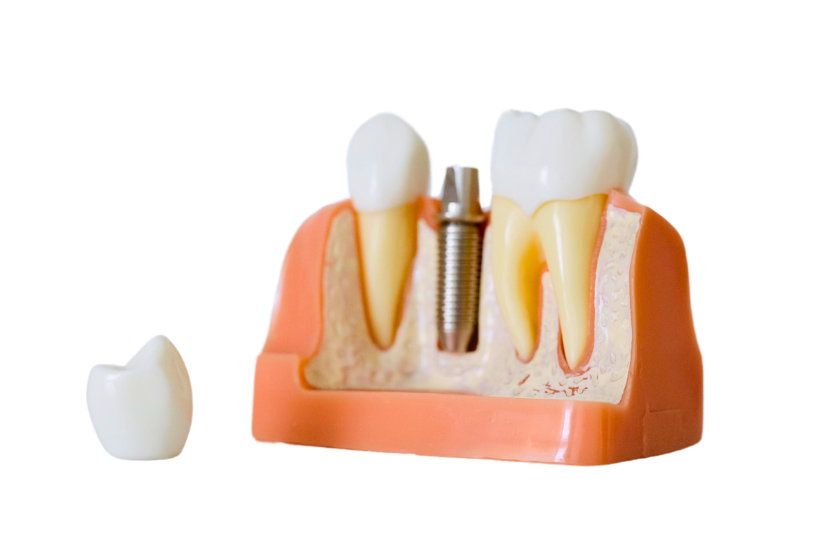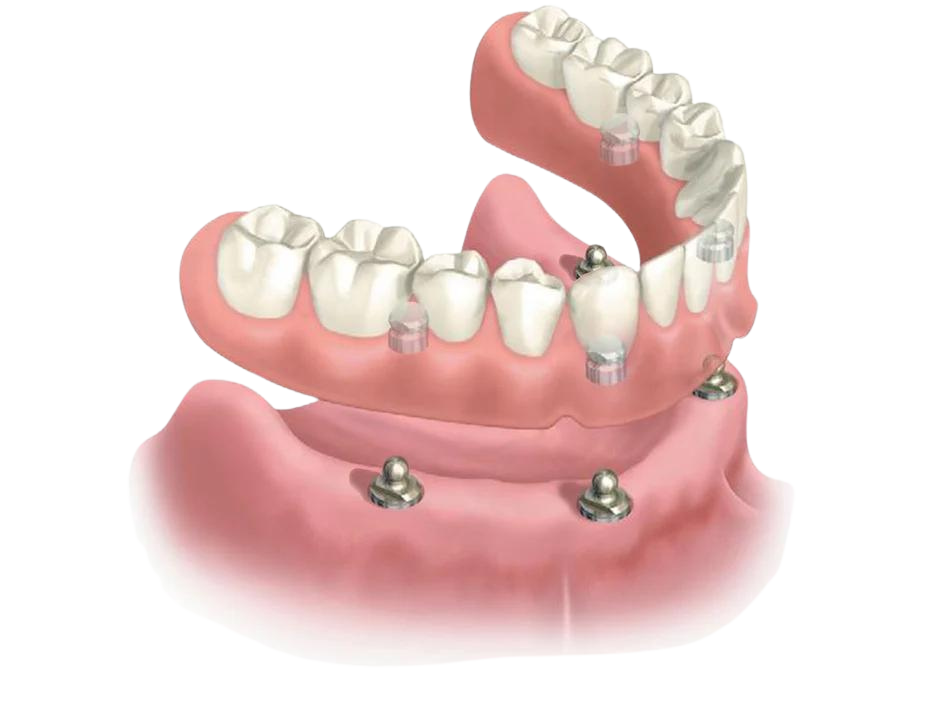IMPLANTS
Precision meets perfection in every implant. Your smile, our artistry.

ARE YOU A CANDIDATE FOR DENTAL IMPLANTS?
- Tired of spending thousands on patch work, fillings, crowns & root canals?
- Looking for a comfortable, lifelong solution with minimal maintenance?
- Do you want a solution that looks and functions just like healthy teeth do?
- Lock in loose or ill fitting dentures to eat what you want! Avoid the nursing home/boost diet.
- Stop the deterioration of your bone to keep facial aesthetics.
WHAT TYPE OF IMPLANTS ARE YOU LOOKING FOR?
SINGLE TOOTH IMPLANTS
WHAT ARE DENTAL IMPLANTS?
Dental implants are the new gold standard for replacing missing teeth in dentistry. Dental implants are designed as a replacement for missing teeth that look, feel and function like your own natural teeth. They restore the ability to eat virtually any food and allow patients to smile with confidence; knowing that teeth appear natural, preserving facial contours.
The dental implants themselves are tiny titanium posts/screws that are anchored into the jawbone where the teeth are missing. The bone osteointegrates (bonds) with the titanium over a three month period allows for fusion of the bone to the implant creating a strong foundation for your new teeth. In addition, dental implants can help preserve facial structure, preventing the bone deterioration which occurs when teeth are missing. Dental implants can be used to anchor complete dentures to provide support and retention for loose dentures.

WHAT ARE THE CONSEQUENCES OF HAVING MISSING TEETH?
At Evergreen Dental we have over 40 years experience. As we lose teeth we still have the same biting force as before but spread over less teeth. As a consequence the other teeth take the brunt of those forces leading to increased breaking of remaining teeth and cavities.
In addition to increased tooth damage, your bone begins to shrink in regions your teeth have vacated. As a consequence adjacent teeth begin to collapse and corresponding upper/ lower teeth begin to overerupt leading to increased sensitivity and pain.
LEARN ABOUT DENTAL IMPLANTS
No! Most implants are placed under local aneasthetic just like any other dental procedure. There is the option for sedation medication to help you relax during the procedure.
Patients must undergo a dental/radiographic examination and health history. During these assessments, your specific needs will be addressed including the location of the implant, the number of implants, the bone in that region and your overall health and suitability for this procedure. After the assessment phase and treatment planning, the implants can be placed surgically into the jawbone. Small titanium posts are then connected to the implant, which protrude through the gums and attach to the artificial replacement teeth. The placement of dental implants involves two surgical procedures:
- Implants are placed within your jawbone. For the first three to six months following surgery, the implants are beneath the surface of the gums, gradually bonding with the jawbone. After the implant has bonded to the jawbone, the second phase begins.
- The team at Evergreen will uncover the implants and attach a small healing collar. At this time an impression is taken to begin making the final restoration. Then posts or attachments can be connected to the implants. The replacement teeth are then made over the posts or attachments and are screwed into or glued onto the implant abutment.
The entire procedure usually takes six to eight months from start to finish with most patients not experiencing any disruption to their daily life.
Implants have a 90-95% success rate. We at Evergreen Dental stand behind our work. They are like a second chance at new teeth. An implant will integrate into the jaw bone and with proper cleaning and maintenance implants will last a lifetime.
We follow the MDA fee guide. We strive to keep the cost down. Some insurances cover implants. We preauthorize everything to your insurance and make payment plans prior to any work.
The Implant surgery itself ranges between $1000 – $2000 dollars and the crowns range between $1500 – $2500.
If your bone is not of high quality or you have lost too much you may require bone graft which is an additional cost. Once the surgery is complete it must be finished with a crown or a denture.
Come visit us today for a free consult to find out what your implant treatment will cost.

A DENTURE ONLY REPLACES HALF THE TOOTH
THE HALF THAT YOU CAN SEE...

DENTURES ARE GREAT FOR AESTHETICS, BUT HAVE A MAJOR DISADVANTAGE WHEN IT COMES TO FUNCTION. AS THEY HAVE NO ROOT OR ANCHOR.
Without replacing the root, changes take place

because of this change, dentures become increasingly loose over time. However, a dental implant replaces the root, which preserves the bone.
CLICK-IN-TEETH
WHAT IS THE “CLICK-IN-TEETH” SOLUTION:
The benefits of implant-retained dentures include improved stability and reduced movement of the denture during eating or speaking. They also help prevent bone loss in the jaw and preserve facial aesthetics.
Additionally, implant-retained dentures can provide a more comfortable fit, eliminate the need for denture adhesives, and allow for a better ability to chew and taste food.
The Cost: Every patient Is different. If you think you’re a candidate for implants or implant supported dentures, fill out this quiz and one of our team members will call you to schedule a free consultation!
THE PROCEDURE
- Meet the Dentist and discuss your goals - FREE CONSULTATION!
- Take a CT scan to see if you are an eligible candidate
- Decide which type of “click in” or “lock in” teeth you want
- Book your appointment, with or without sedation.
- Dental implants are surgically placed into the jawbone. We may perform a bone grafting procedure to add or strengthen the bone. Once the implants/bone are placed; heal for 3 months, this allows the bone to heal and integrate with the new implant(s).
- Decide if a temporary set of dentures is necessary during healing time.
- After the 3 months has passed, abutments are attached to the dental implants, these serve as attachment points for the denture.
- Attach your “click in” or “lock in” teeth!
WHY REGULAR DENTURES SUCK
Lorem ipsum dolor sit amet, consecteturasdfasdf adipiscing elit. Ut elit tellus, luctus nec ullamcorper mattis, pulvinar dapibus leo.
When natural teeth are lost, the jawbone in the area of the missing teeth can gradually shrink or resorb over time. This can lead to a decreased ridge height and volume in the lower jawbone, resulting in less support for the denture. Without adequate bone support, it can be more difficult for lower dentures to stay in place and achieve proper suction.
The tongue and muscles in the lower mouth play an active role in chewing, speaking, and swallowing. These movements can sometimes dislodge lower dentures, particularly if the denture does not have a proper fit or lacks sufficient stability. The constant movement of the tongue can also create a suction-breaking effect, making it challenging for the denture to maintain a secure hold.
Some individuals may experience a reduction in salivary flow, which can affect the retention of lower dentures. Saliva helps create a suction effect that holds the denture in place. When there is inadequate saliva, it can hinder the denture’s ability to maintain suction, resulting in a less secure fit.
Upper dentures can benefit from the natural suction created by the palate, which helps retain the denture. However, the lower jaw does not have the same advantage, and lower dentures rely primarily on the underlying bony ridge and suction for stability. Upper dentures cover the roof of the mouth to create suction. Patients find this uncomfortable, inducing gag reflexes, effecting speech and ability to east and enjoy foods.
HOW WE FIX IT
GOOD

Regular Denture
20%
A denture is great for creating an aesthetically pleasing smile. Although, they will be loose.
BETTER

Clip-in Denture
40-60%
Implant dentures eliminate looseness and give you a great looking smile that fits snug in your mouth.
BEST

Permanent Teeth
90%
Use implants to replace your teeth. Imagine having an open palate and brushing your teeth in your mouth instead of soaking them in a cup!


Conventional Denture
$
Look Great
Reduced Pain & Sore Spots
Tighter Than Old Ones
Limiting and Frustrating Diet
Jawbone Continues Shrinking Making Things Worse Over Time
Embarrassing Floating Denture
Food Can Get Underneath

2 Implant Clip on Denture
$$
Looks Great
Even Less Pain & Sore Spots
No Embarassing Floating Denture
Much Better Chewing
Preserves Front of Jaw Only
Can Still Rock a Little
4 - 6 Month Waiting Period
"O-Ring" Changes Needed Approximately every 6 months

4 Implant Clip on Denture
$$$
Looks Great
Very Comfortable
No Rocking, Very Stable
Ability to Eat Almost Anything
Preserves Front and Back
Front and Back Stay Down
Same Day Use
"O-Ring" Changes Needed Approximately every 6 months

Permanent Denture
$$$$
Looks Great
Sores are not an Issue
No Movement at All
Ability to Eat Almost Anything
Preserves Front and Back
Front and Back Stay Down
Same Day Use
No "O-Ring" Changes Needed
Smallest & Most Comfortable
Regular Cleanings Needed


